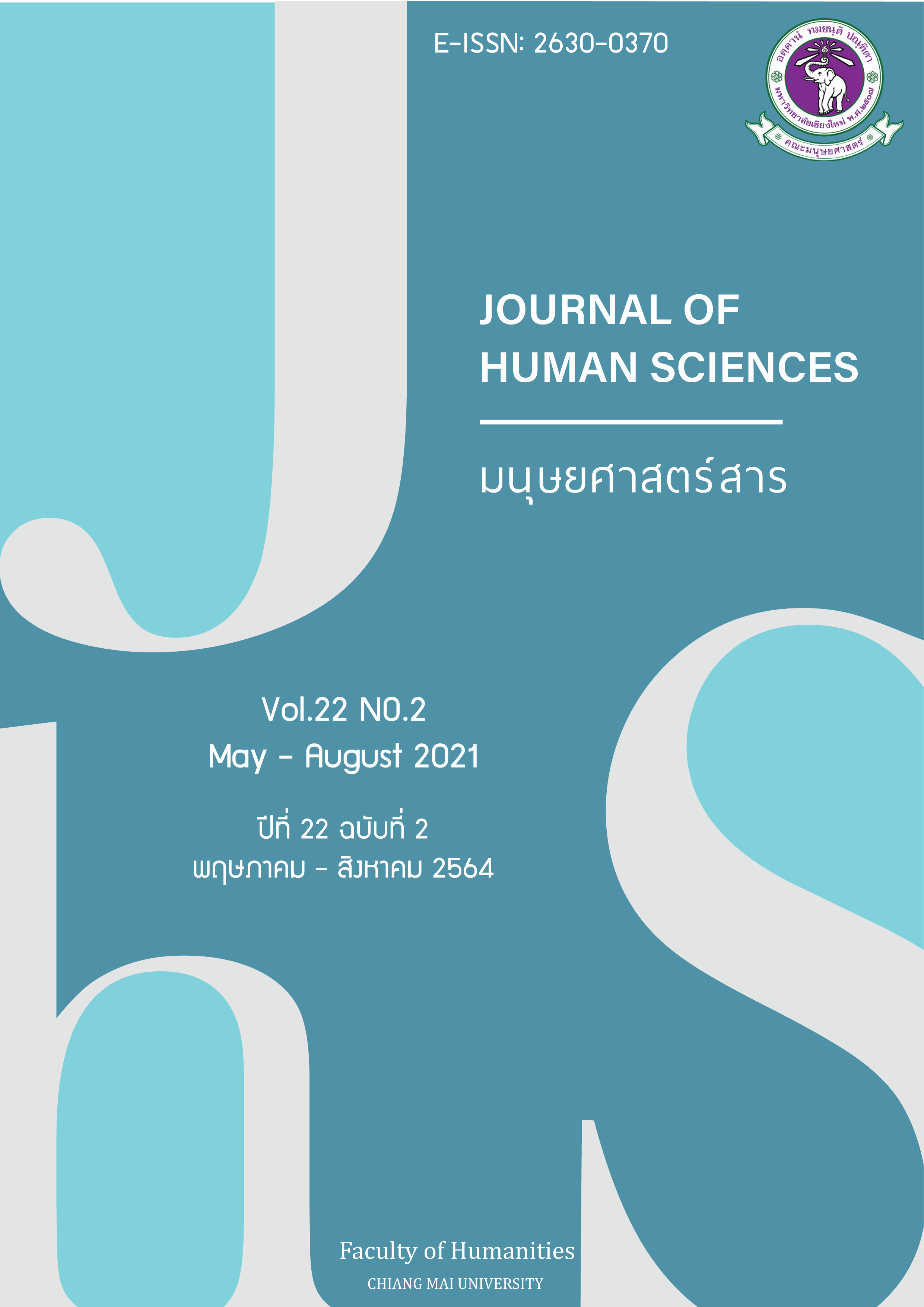มานุษยวิทยาการพยากรณ์: ประสบการณ์ในการพยากรณ์ดวงชะตาบนพื้นที่สื่อสังคมออนไลน์ ในชีวิตประจำวันของชาวดิจิทัลไทย
Main Article Content
บทคัดย่อ
บทความวิจัยนี้มีวัตถุประสงค์ในการศึกษา คือ 1) เพื่อศึกษาเชิงเปรียบเทียบประสบการณ์ของการใช้บริการทางโหราศาสตร์ การพยากรณ์ออนไลน์และความเชื่อทางไสยศาสตร์ในชีวิตประจำวันของชาวดิจิทัลไทยรุ่นใหม่ในจังหวัดกรุงเทพฯ และนครพนมว่ามีความแตกต่างกันหรือไม่ อย่างไร 2) เพื่อวิเคราะห์และทำความเข้าใจในความสำคัญและอิทธิพลของคุณค่าและความหมายของโหราศาสตร์ การพยากรณ์และความเชื่อทางไสยศาสตร์ในชีวิตประจำวันของชาวดิจิทัลไทยรุ่นใหม่ในจังหวัดกรุงเทพฯ และนครพนม 3) เพื่อศึกษาและทำความเข้าใจว่าเทคโนโลยีดิจิทัลส่งผลอย่างไรต่อรูปแบบของโหราศาสตร์และการพยากรณ์ บทความนี้ประยุกต์ใช้ระเบียบวิธีวิจัยเชิงปริมาณและคุณภาพ โดยเริ่มจากการเก็บแบบสอบถามแบบออนไลน์ จากนักศึกษามหาวิทยาลัย จำนวน 120 คน ซึ่งอาศัยในจังหวัดกรุงเทพฯ และนครพนม รวมถึงข้อมูลจากการสัมภาษณ์เจาะลึก จำนวน 6 คน บทความนี้ประยุกต์ใช้กรอบแนวคิดทางมานุษยวิทยาการพยากรณ์เพื่อทำการวิเคราะห์บทบาทและความสำคัญของการพยากรณ์และความเชื่อเรื่องโชครางในชีวิตประจำวันของนักศึกษามหาวิทยาลัยที่เคยเข้าร่วมการพยากรณ์ออนไลน์และการปฏิบัติตามรูปแบบความเชื่อที่หลากหลายผ่านสื่อสังคมออนไลน์ บทความวิจัยนี้อภิปรายว่าเทคโนโลยีดิจิทัล โดยเฉพาะสื่อสังคมออนไลน์ได้เชื่อมโยงพลเมืองดิจิทัลรุ่นใหม่ในรูปแบบของเครือข่ายทางสังคมเสมือนจริง (Virtual Social Network) ที่มีบทบาทสำคัญต่อการปรับตัวและเปลี่ยนแปลงความหมาย รูปแบบและบทบาทหน้าที่ของการพยากรณ์ในชีวิตประจำวัน อินเทอร์เน็ตเป็นสื่อกลางของการถ่ายทอดและพัฒนารูปแบบใหม่ๆ ของโหราศาสตร์และการพยากรณ์ การพยากรณ์บนสื่อสังคมออนไลน์คือรูปแบบหนึ่งของนวัตกรรมทางความเชื่อที่สนองตอบต่อความคาดหวังของชาวดิจิทัลรุ่นใหม่ที่ต้องการบริการทางศาสนาที่เป็นรูปธรรม เข้าใจได้ง่ายและมีความยืดหยุ่น อีกทั้งช่วยเติมเต็มความต้องการของชาวดิจิทัลในการสร้างความรู้สึกมั่นคง ปลอดภัย มีความเป็นส่วนตัว และสร้างความมั่นใจว่าเขาสามารถควบคุมชีวิตตนเองได้ ประการสุดท้ายคือเทคโนโลยีการพยากรณ์ช่วยเปิดโอกาสให้ชาวดิจิทัลเข้าถึงข้อมูลเพื่อประกอบการตัดสินใจหรือได้รับทราบถึงทางเลือกในการตัดสินใจแก้ไขปัญหาในชีวิตประจำวัน
Article Details
เอกสารอ้างอิง
Atkinson, J. M. (1987). The Effectiveness of Shamans in an Indonesian Ritual. American Anthropologists, 89(2). 342-355, https://doi.org/10.1525/aa.1987.89.2.02a00040.
Campbell, H. (2013). Digital Religion: Understanding Religious Practice in New Media Worlds. NY: Routledge.
Cook, N. M. (1989). Astrology in Thailand: The future and the recollection of the past. (PhD. diss. The Australian National University)
Comaroff, J., & Comaroff, J. L. (2000). Millennial Capitalism: First Thoughts on a Second Coming. North Carolina: Duke University Press.
Evans-Pritchard, E. E. (1937). Witchcraft, Oracles, and Magic among the Azande. Oxford: Clarendon Press.
Geng, L. (2015). Fate calculation experts: diviners seeking legitimation in contemporary China. PhD diss., The Australian National University.
Girvan, C. (2018). What is a virtual world? Definition and classification. Education Tech Research Dev, 66. 1087-1100. https://doi.org/10.1007/s11423-018-9577-y.
Hefner, R. (2010). “Religious Resurgence in Contemporary Asia: Southeast Asian Perspectives on Capitalism, the State, and the New Piety.” The Journal of Asian Studies, 69(4). 1031-1047. doi: 10.1017/S002191181000291.
Hicks, D. (Ed.) (2010). Ritual and Belief, Readings in the Anthropology of Religion. UK: Altamira Press
Jackson, P. (1999). The Enchanting Spirit of Thai Capitalism: The Cult of Luang Phor Khoon and the Postmodernisation of Thai Buddhism. Southeast Asia Research, 7(1). 5-60.
https://doi.org/10.1177/0967828X9900700102.
Jackson, P., & de la Perriere, B. (2020). A World Ever More Enchanted, Efflorescing Spirit Cults in Buddhist Southeast Asia. Copenhagen: Nias Press.
Malinowski, B. (1979). Magic, science and religion and other essays. Boston: Beacon Press.
Kanjanaphan, A. (2020). Kao kham kap dap khwam chưa khu trongkham nai sangkhom Thai [Crossing Over the Trap of Binary-Opposition’s Beliefs in Thai Society], Developed from the Seminar Topic Entitled “Beliefs in Thai Society and Science,” Social Research Institute, Chiangmai University.
Kennedy, D. & Fox, R. (2013). ‘Digital natives’: An Asian perspective for using learning technologies. International Journal of Education and Development using ICT, 9(1). 65-79.
Line Official Account. (2020). LINE du duang. Retrieved from https://www.lineofficialaccount.com/what_is_line_horoscope.php
Matichon online. (2561). phro̜ arai thammai tong mu (telu) [why supernatural/magical believe?] Retrieved from https://www.matichon.co.th/lifestyle/news_1398915
Pattana, K. (2012). Mediums, Monks, and Amulets: Thai Popular Buddhism Today. Chiang Mai: Silkworm Books.
Pérez-Escoda, A., Castro-Zubizarreta, A., & Fandos-Igado, M. (2016). Digital skills in the Z generation: Key questions for a curricular introduction in Primary School. [La competencia digital de la Generación Z: Claves para su introducción curricular en la Educación Primaria]. Comunicar, 49. 71-79. https://doi.org/10.3916/C49-2016-07
Poonnatree, J. (2018). Khmer Ways of Seeing, Migration and Divinatory Improvisation in Phnom Penh (Doctoral Dissertation). The Australian National University. Canberra
Post Today. (2019). [Being introduced by what mưang rong [less visited areas] is and the 55th provinces where tourists should go]. Retrieved from https://www.posttoday.com/life/travel/587425.
Saini, E. (2018). Stranger Diviners and Their Stranger Clients: Popular Cosmology-Making and Its Kingly Power in Buddhist Thailand. South East Asia Research, 26(4). 416-431.
Sørensen, J. (2013). Sortes virtuales: a comparative approach to digital divination. Scripta Instituti Donneriani Aboensis, 25. 181–188. https://doi.org/10.30674/scripta.67439
Radcliffe-Brown, A. R. (1922). The Andaman Islanders. N.P. The University Press.
Taylor, P. (2007). Cham Muslims of the Mekong Delta: Place and mobility in the cosmopolitan periphery. Singapore: NIAS Press.
Taylor, P. (2004). Goddess on the Rise: Pilgrimage and Popular Religion in Vietnam. Hawaii: University of Hawaii Press.
Thianthai, C. (2020). Kansang khwamkhaochai nai khunnalaksana phrưttikam lae thatsanakhati nai anakhot khong chao dichithanthai [Understanding Thai Digital Natives’ Characteristics, Behaviours, and Their Views of the Future]. (Raingan phon kanwichai chabap sombun) [Full Report]. Samnakngan khana kammakan wichai haeng chat [National Research Council of Thailand].
Turner, V. (1975). Revelation and divination in Ndembu ritual. Ithaca: Cornell University Press.
Weber, M. (1905, 1958) Protestant Ethics and The Spirit of Capitalism. NY: Charles Scriber’s Son.


